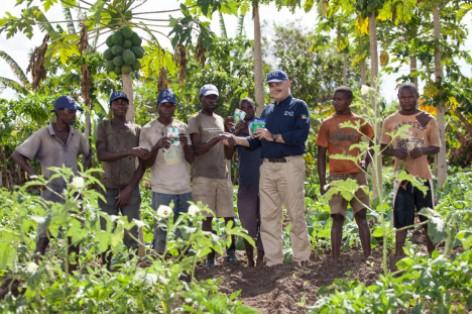
Environment
Our management methods are designed to acknowledge the environmental impact of our activities, to assess this impact and to reduce it. Environmental management is part of our sustainable development approach.

Our management methods are designed to acknowledge the environmental impact of our activities, to assess this impact and to reduce it. Environmental management is part of our sustainable development approach.
We promote recruitment from the communities living close to our operational sites in order to improve their daily lives, provide training and offering them a lucrative and stable job.
99% local employment in 2022
In Chad, for example, all the operational management positions are held by local people and all of the staff hired to provide services to our client EEPCI (ExxonMobil) are Chadian nationals


CIS supports local agricultural production by developing partnerships with local suppliers and by creating cooperatives with local farmers. Several hundred local agricultural cooperatives are included in the CIS value chain: more than 96% of purchases are made locally for all available products in 2022.
In Mozambique, CIS has implemented a sustainable development programme called Seeds for Development. This initiative supports 250 local farmers, by helping them learn sustainable farming techniques that they can then use to diversify their production and increase their crop yield.
In Kazakhstan, we buy all available products from local producers.
In Chad, CIS has created farming businesses that are now managed by the local community.


In all of its subsidiaries, CIS is involved in initiatives to improve the daily lives of children and families belonging to the local community.
In Burkina Faso, CIS supports the non-profit organisation ASEFV (Association Soutien aux enfants et femmes vulnérables), which assists vulnerable women and children. Through this non-profit, CIS has already partnered the creation of an orphanage, which is home to fifteen children since 2017, and has financed the purchase of a cereal mill that will eventually be managed by ASEFV directly.
This year, in Chad, CIS has created a sustainable development programme called «A Brighter Future» to guide its actions. CIS Chad is a partner of the Grand Coeur Foundation, whose First Lady of Chad, Mrs. HINDA DEBY ITNO is the President. This foundation aims to fight against social inequalities, to improve the well-being and the development of populations and to promote merit and excellence.
CIS Chad also supports the orphanage of the «God Bless» Foundation, helping a hundred children in N’Djamena.


CIS has introduced composting on many of its operational sites. Waste is destroyed and reused to fertilise the soil for new crops (cabbage, peppers, etc.), thus providing a substitute for chemical fertilisers.
Our teams are in the process of rendering on-site QHSE inspections paperless by introducing electronic archiving solutions for QHSE data, temperature, health and other controls. This will ensure high-quality monitoring and facilitate reporting.
Our Chadian subsidiary has achieved its goal of reducing its impressions by 30%.


Our management methods are designed to acknowledge the environmental impact of our activities, to assess this impact and to reduce it. Environmental management is part of our sustainable development approach.

We promote recruitment from the communities living close to our operational sites in order to improve their daily lives, provide training and offering them a lucrative and stable job.
99% local employment in 2022
In Chad, for example, all the operational management positions are held by local people and all of the staff hired to provide services to our client EEPCI (ExxonMobil) are Chadian nationals

CIS supports local agricultural production by developing partnerships with local suppliers and by creating cooperatives with local farmers. Several hundred local agricultural cooperatives are included in the CIS value chain: more than 96% of purchases are made locally for all available products in 2022.

In Mozambique, CIS has implemented a sustainable development programme called Seeds for Development. This initiative supports 250 local farmers, by helping them learn sustainable farming techniques that they can then use to diversify their production and increase their crop yield.
In Kazakhstan, we buy all available products from local producers.
In Chad, CIS has created farming businesses that are now managed by the local community.

In all of its subsidiaries, CIS is involved in initiatives to improve the daily lives of children and families belonging to the local community.
In Burkina Faso, CIS supports the non-profit organisation ASEFV (Association Soutien aux enfants et femmes vulnérables), which assists vulnerable women and children. Through this non-profit, CIS has already partnered the creation of an orphanage, which is home to fifteen children since 2017, and has financed the purchase of a cereal mill that will eventually be managed by ASEFV directly.

This year, in Chad, CIS has created a sustainable development programme called «A Brighter Future» to guide its actions. CIS Chad is a partner of the Grand Coeur Foundation, whose First Lady of Chad, Mrs. HINDA DEBY ITNO is the President. This foundation aims to fight against social inequalities, to improve the well-being and the development of populations and to promote merit and excellence.
CIS Chad also supports the orphanage of the «God Bless» Foundation, helping a hundred children in N’Djamena.

CIS has introduced composting on many of its operational sites. Waste is destroyed and reused to fertilise the soil for new crops (cabbage, peppers, etc.), thus providing a substitute for chemical fertilisers.

Our teams are in the process of rendering on-site QHSE inspections paperless by introducing electronic archiving solutions for QHSE data, temperature, health and other controls. This will ensure high-quality monitoring and facilitate reporting.
Our Chadian subsidiary has achieved its goal of reducing its impressions by 30%.